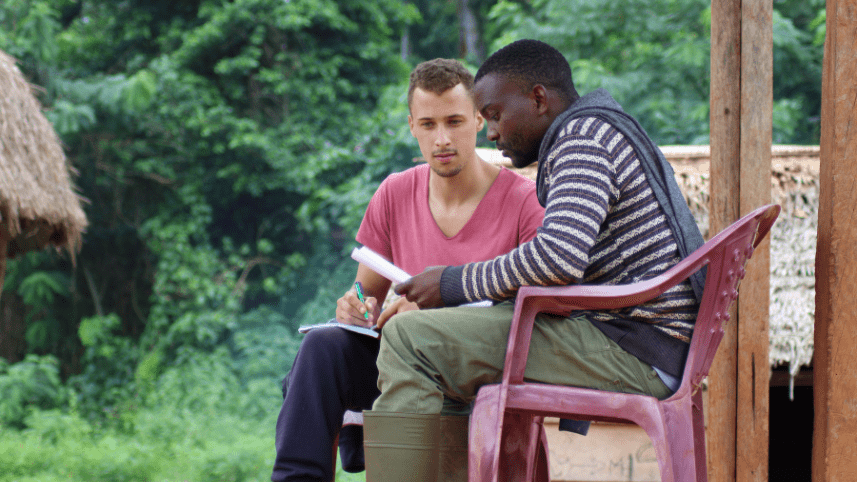FORESTS

FORESTS aims to protect forest areas threatened by human activity (timber trade, bushmeat, hunting, subsistence farming, etc.) and to preserve and promote sustainable livelihoods for local communities.
Funded by the European Commission, this action is part of the EU Aid Volunteers 2019 initiative for a period of 3 years, from December 2019 to December 2022. It aims to preserve forest ecosystems and reduce the vulnerability of local populations in Cameroon, Congo, Ghana, Guinea and Vietnam.
The project
Context
Within the framework of the EU Aid Volunteers initiative, funded by the European Commission, France Volontaires, ESI Labs! (Latvia) and SRD (Vietnam) are working with the authorities as well as with several dozen civil society organisations in five partner countries (Cameroon, Congo, Ghana, Guinea and Vietnam).
This project aims to protect forest areas threatened by human activity (trade in wood products, firewood, hunting, subsistence farming, etc.) and to preserve and/or promote sustainable livelihoods for local communities. Some thirty European volunteers are involved.
This ambitious project, implemented on three different continents, will make it possible to broaden the framework of action, compare good practices and develop recommendations from a wide variety of contexts.
Description
Implemented in Cameroon, Congo, Ghana, Guinea and Vietnam, EUAV Forests is a project that deploys some 30 European volunteers to promote examples of sustainable cohabitation between forest areas and riparian communities.
Through individual citizen engagement and the hosting of the 30 European volunteers by partner country organisations, EUAV Forests is putting experienced Vietnamese forestry partners in contact with partners in West Africa interested in tried and tested good practices.
This connection allows us to examine the repeatability of the experiences. European organisations are also involved in order to feed advocacy activities with illustrations from the three continents.
Objectives
Thirty European volunteers are being deployed to support the development of engagement and resilience of forest-dwelling communities.
Their objectives include contributing to:
- Identifying at-risk areas, forest stakeholders and vulnerable communities; putting these stakeholders in contact and supporting the emergence of solutions that have been agreed together;
- Strengthening the resilience of communities living in forest areas;
- Promoting collective initiatives and commitments to protect forest areas;
- Strengthening partners in terms of project engineering.
Action levers
Three types of mission were entrusted to European volunteers:
- Support for project engineering proposed to partners and civil society organisations involved in the protection of forest areas (mapping of stakeholders and needs, networking and coordinating networks and support for the collective development of innovative projects);
- Support for communication and visibility initiatives based on good practices; mass awareness-raising on forest protection issues; advocacy initiatives targeting decision-makers at several levels (local, national and regional authorities, donors and private sector stakeholders);
- Participation in the activities of organisations specialised in forest protection (agroforestry project, initiative to monitor protected/endangered forest areas, support to projects promoting circular economies).
Partners
The consortium partners are ESI Labs! (Latvia) and the SRD (Vietnam).
Many other civil society organisations from Cameroon, Congo, Ghana, Guinea and Vietnam are involved in the project. In Ghana, Eco Care enables two volunteers to participate in its scheduling. In Cameroon and Congo, the Réseau des Acteurs du Volontariat et de Solidarité Internationale (RAVSI – Network of Volunteering and International Solidarity Stakeholders) is heavily involved. Finally, the public services of the partner countries are naturally involved throughout the project in order to provide technical expertise and to discuss the best practices promoted by the project.


